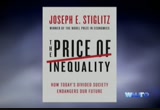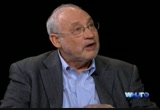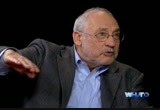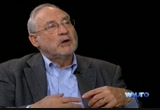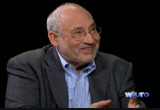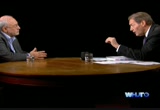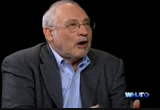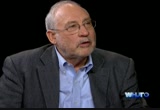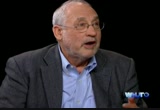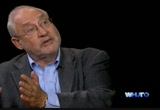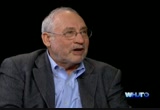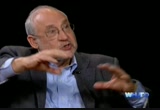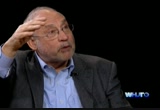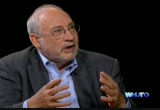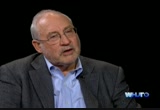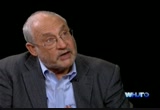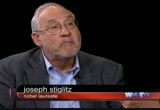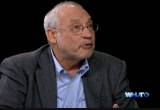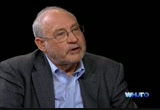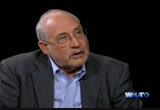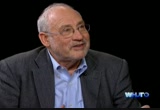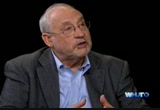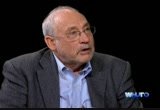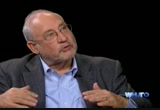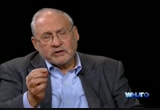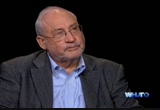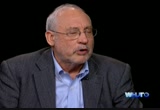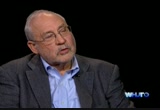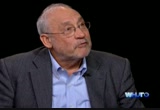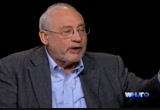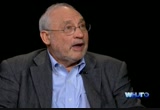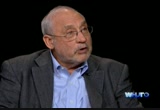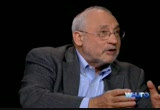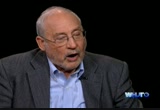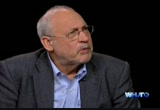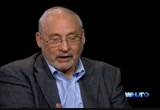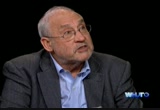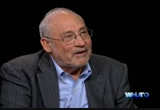tv Charlie Rose WHUT October 6, 2012 3:00am-4:00am EDT
3:00 am
99% and the 1%, joseph stiglitz, nobel prize winning economist. >> this is a way of saying that most americans are in the same boat. and this is the small number, whether it's 1% or 1/10 of 1% that's not-- that's a detail. but the point is there are these two very different groups in our society. one very small, one representing almost everybody. but they've come to live very different lives, see the world through different eyes. >> rose: we conclude this evening with a conversation recorded at the clinton global initiative with chelsea clinton, the daughter of former president
3:01 am
clinton and secretary of state hillary clinton. >> you don't have to be bill clinton and have a platform like this or bill gates and have, you know, almost infinite resources to muster towards something. but that through the methodology and ethos of making a commitment and defining a specific objective and specific metric to one self and one partners to reaching that objective, that people will be truly invigorated to apply that thinking and that approach toward whatever it is that they really care about locally or globally. >> rose: joseph stiglitz and chelsea clinton when we continue. funding for charlie rose was provided by the followingal
3:02 am
3:03 am
from our studios in new york city, this is charlie rose. >> rose: the debate over the widening economic divide there this country has intensified it helped spark the occupy wall street movement one year ago and has also been a key issue the presidential campaign as the economy continues to falter. >> this country doesn't succeed when only the rich get richer. we succeed when the middle class gets bigger. >> rose: joseph stiglitz is a nobel prize winning economist. in his new book the price of inequality, how today's divided society endangers our future. he argues that a wealthy minority in this country has fed a vicious circle of growing inequality. i'm pleased to have joe stiglitz back at this table. welcome. >> nice to be here. >> rose: where do you think the american economy is today? and is it trending upwards? >> it's not really trending upward. i guess i would describe it as part of-- i call it a long slump, long malaise unless we do something. >> rose: right.
3:04 am
>> you know there are two big gaps in our economy, relative to say 2007 before the crisis. one is real estate. real estate was the big sector, the bubble broke and now real-estate investment is half of what it was. no way that that is going to recover soon. the only good news is the houses were shodly constructed and it may be 5 or 10 years we'll have to reconstruct them. but any time soon we're not going to go back to that kind. >> rose: an too many people ended up with mortgage these couldn't afford. >> exactly. and that is part of the thing, the second part of the problem, consumption. before the crisis we were saving close to 0 out of our disposable income. that wasn't takenable. and didn't make long-term sense. but it sustained economy. now savings is between 4 and
3:05 am
5%. hopefully it won't go lower than that. every once in a while you hear from administration, the fed, the consumer is coming back. i think that's not the basis of sustained long-term growth. but with qon shump-- consumption weak and investment in real estate weak, very hard to get really a robust economy. >> rose: but there are people who look at the housing crisis and see the beginnings of a comeback. >> it may be leveling off. and it may even, you know, turn up a little bit. but we're not going to go back to anywhere near where we were because that was a distorted economy. the bubble was a distorted economy. so i think yes, we might feel more relaxed that we've hit bottom. still not clear because there's a massive number of foreclosures down the line. still about 20% of all americans are underwater. >> rose: was that one of the failures of the obama administration not to deal with the housing crisis as
3:06 am
part of the financial collapse. >> very much so but you have to remember he inherited the problem. bush hadn't even talked about it. obama said let's do something. but then what they proposed was simply inadequate. >> rose: was it because they focused on the financial sector at the exclusion of the housing issue? >> basically, basically. part of it was they were worried at the time that the kinds of things you needed to do. restructure the mortgage, write down the mortgages, would weaken the banking system. and they were more focused on helping the bankers than homeowners. you know, ode citizens. and i think that was a big mistake. >> rose: when you look at 2008 and the decisions made first by the bush administration, paulson, bernanke, geithner and later decisions by the president, summers and geithner and others or bernanke, were the right decisions at the time to deal with the financial crisis to avoid going over
3:07 am
into some abyss? >> they prevented us from going into the abyss, i think that's right. >> rose: so what they did was right but they didn't do enough. >> and they didn't do it in the right way. so for instance one of the issues that is very big now, i don't think it is the core issue, is the deficit. if when they bailed-- saved the bank, they didn't have to save the bankers. they didn't have to save the creditors to the bank. >> rose: meaning they could have saved the bank and made a condition of the rescue that the executives who were in charge of the banks had to be replaced. >> exactly. u.k. did that. and they could have said no bonuses, if we give you money, you can't put out the money in bonuses. they could have told-- these banks were basically bankrupt is so the normal bankruptcy, shareholders lose everything. now the shareholders have a lot. so all that money that went to the bondholders and to
3:08 am
the shareholder kos have gone to the u.s. taxpayers. and we would be the much better financial shape now. so in a sense, they could have also demanded as a condition of giving money no more abusive credit card practise t no more discriminatory lending, no more predatory lending. banks go back to lending in the way that they're supposed to. small, medium size enterprises. >> were those kinds of reforms in your judgement enacted by dodd frank? >> dodd frank went a little bit of the way but not as much as we needed to go. and because the banks at that point were already powerful enough. there was that moment when the balance of power had changed. where the banks needed the u.s. government and we were in a position to tell the banks, let's go back to the social function, very important social functions. the banks have to provide in our society. and we lost that moment.
3:09 am
>> rose: and the condition of the banks today is, of the big banks in wall street. >> well, to be frank, we really aren't sure because there's not the kind of transparency that we need. like one of my criticisms of dodd frank, we kept a lot of, for instance, these derif deriff-- derivative transparents. >> they made them a lit bit more. >> but as long as you have so much money at stake where you don't know what is at risk, you know, let me just give you one example. there are about 3 to 350 trillion dollars of derivatives that are based on libor. libor we now know is a-- number. >> explain what that is. >> the london interbank lending rate. so it's the rate, supposed to be an arm's length rate at which unone bank lends to each other. but the banks aren't lend fog each other s so what
3:10 am
does it mean? it's a concept-- what rate do we think some other bank would lend to us. and we now know a, that they manipulated that rate. >> rose: these are the accusations about barclays. >> more than accusation, there was a settlement on it. and a lot of stuff on other bank, don't just pick on barclays t was a lot of other banks. >> rose: that they manipulated the libor rate. >> very much so. and we also know that you can look at these rates and they remain steady. and meanwhile you look at the credit default swap which is a measure of how risk the bank is and the value of a bank's debt which represents again a measure of riskiness at the bank. and it's going up and down and the market saying this bank is very risky. and they claim they can borrow at the same rate that they borrowed when they were healthy. nonsense. this is a phony number. and yet we have 350 trillion dollars of derivatives,
3:11 am
contracts based on this phony number is so what i mean is we don't really know, there's just so much lack of transparency in our financial system that it's very hard to get a good assessment of how strong it is. >> but i thought the banks took stress tests and did other things to measure whether they had sufficient capital requirements. >> they're much better than they were, no doubt about that. >> rose: there is a basal 3 and -- >> that doesn't come in until 2019. just to give you one other example. the europeans went through a stress test. >> rose: right. >> and not long after the irish banks, they said they were fine. they collapsed. they did another stress test, they said we're going to be tougher this time. not long after they went through it, one the banks did very well, went bankrupt. so what we know is we don't
3:12 am
know. >> rose: do we need international standards so the capital doesn't flow from one country to another in terms of looking for better conditions? >> i think we do need to have international standards. one of the difficulties though is that implicitly governments inevitably do back the banks, in one way or another, they are going to save the depositors when there's trouble. as one of my friends said there are two kinds of country, those that have deposit insurance and know it and those that have deposit insurance and don't know it. so implicitly they are going to back it. now what does that mean? that means that if you have a strong government like germany, money's going to flow to german banks rather than out of spanish banks are because depositors in spoonish banks-- . >> rose: are worried they are going to go up. >> going go under and they worry, spain might want to bail them out but can they?
3:13 am
>> rose: let me go back to the american banking system and the financial system here. are big banks in a better place than regional banks and smaller banks or is it the reverse? >> no, no, the big banks really were the beneficiary of much of the bailout, disproportionately. about 400 banks railroad so have a smaller banks have gone bankrupt. >> rose: and then people are going around buying them up and creating new financial institutions. >> and our banking system as a result is more concentrated than it was before. and that leads to this problem of too big to fail banks. >> i was going say that. >> and when you have banks that are too big to fail, they know they can gamble. they gamble. if they win they walk off with the profits. if they lose, the taxpayer has to bail them out. now dodds frank said we're going to take care of that. i don't think anybody believes that dodd frank fixed it. >> you say that the problems that we ran into, that created sort of the 1% and what you see, the inequality
3:14 am
that exists, and also what it might mean in the long run to our economy began with the deregulation of the reagan administration. >> that probably is the most dramatic moment. and the reagan administration did more than just deregulation. they lowered the taxes on the top. one of the things to remember, several decades after world war ii were decades in which the country grew much faster than it did in the decades after 1980. and the country grew together. every group grew but the bottom grew more than the top. so we-- we grew together. after 1980, we grew most slowly and we grew apart. one of the things is we lowered the tax rates on the top. that increased the divide. and the other one is we deregulated, particularly in the financial sector, continued under clinton,
3:15 am
under bush. >> rose: where you were the chairman of the council of economic -- >> i opposed those deregulation movements. but this deregulation allowed the banks more scope for moving money from the bottom, all those kind of predatory lending and kinds of practices that we saw. move the money from the bottom to the top. and if you look disproportionately large number of people at the top, in that 1% are from the financial sector. as a teacher, i see it in a slightly different way. i see a disproportionately large number of our best students going into finance. >> rose: talk to me about the 1% and the 99%. i mean how it came into being and what you believe it does to values, and the future of the economy and being able to deal with the debt. >> well, the, is there is a
3:16 am
way of saying that most americans are in the same boat. and this is just a small number. whether it's 1% or 1/10 of 1%, that's not-- that's a detail but the point is there are these two very different groups in our society. one very small, one representing almost everybody. and they have come to live very different lives. see the world through different eyes. we used to say that watching income distribution change, changes in the share of income was like watching the grass grow. it happened to slow you couldn't see it. but in the last 10 years it's been happening very rapidly. so for instance the share of the national income that goes to the 1% since 1980. and the share of the national income that goes to the upper 1/10 of 1% has increased by a factor of 3 to 4. >> and has the contribution they have made in terms of contributing to the revenue
3:17 am
side of the balance sheet gone up? >> hard to say -- >> because that's win of the arguments they make as you know. >> one of the arguments that i make in my book is that much of this is what i call rank seeking. in other words, we distinguish between activities that increase the size of the national pie and activities that will directed at getting a larger share of a given economic pie. and much of the activity of those in the 1% is rent seeking. >> rose: what dow mean by that. >> getting a larger share of this national pie so let me give you some examples. a monopolist is a kind of rent. the way the monopolist gets his exthat return is by reducing output. he restrains output and that allows him to drive up prices. somebody without goes to congress and, the drug company goes to congress and
3:18 am
say sell me the drugs at the prices that we demand no competitive bidding, no-- no negotiations. even though the u.s. government is the largest buyer. the as a result of that one provision distorts our economy, is that it was estimated that american taxpayers pay something like a half a trillion dollars over ten years to the drug companies. those are rents. in other words, unnecessary payments that go from one party to another. >> rose: you have argued in this book, you argue, you just said it, you argue that the 1% as it gains political power, it uses it to protect itself from the market and from competitive factors. >> that's right. and you can see it in all sorts of ways. >> and to seek better tax policy that increase as well. >> tax policies, for instance, an example is speculators are taxed at half the rate of those who
3:19 am
work for a living. and to me the sounds and is unfair but also distorts our economy. because it means we encourage more resources, human and financial resources to go into speculation rather than to wealth creation. >> rose: so what does this do to our, you talk about the moral issues and to the moral fabric. >> well, when people-- . >> rose: the value equation. >> when people see others getting money not from making a contribution, but rather from taking advantage of others, from predatory lending, abusive credit card practices, it really undermines, i think, the moral fiber of our society it seems that money is put over everything. money is rewarded over everything. >> and you would correct that imbalance in what way? tax the wealthy along the lines that warren buffett argues or others or more
3:20 am
dramatic tax reform. >> well, i think what warren buffett has argued is absolutely necessary. i think that's important to create a shared community that at least you're saying those who are at the top-- . >> rose: meaning that we should tax capital gains as much as we tax ode income. >> exactly. and the consequence of that is that those at the top who are taking advantage of capital gains would pay at least as much as those whose income was much lower. >> and what impact would that have on their investment? >> i think would have a negligentable effect. >> they would argue otherwise. >> i think they're basically wrong. but let me say, even if you were concerned about investment, you could structure our tax code to encourage investment a lot better. let me give you an example. a lot of the capital, special benefits of capital gains come not from firms who are investing in the future of our country. land speculation, you know, if you get capital gains
3:21 am
from land does it create more land? it doesn't create more land. the banks that were speculating on cdses when they win they get capital gains taxationment does that make our economy grow? no, it makes our economy in some sense even more risky. and that was one company, remember, aig got 180 billion dollar bailout out of that speculation. so if you wanted to say. >> speculating on credit default swaps mainly. >> exactly so if you wanted to say let's encourage investment, i could see an argument saying corporations that invest in america will get tax preferences, entrepreneurs that expand their investment and create new jobs will get a tax benefit. >> rose: but therefore you are-- it's okay with you if you use the tax code to cretin sen difficult on the part of the private sector? >> that's right, it is. but it has to be directed, linked to. >> certain policies or certain places. >> to doing things that make our economy stronger, not to
3:22 am
gambling, not to speculation, not to just being wealthy. >> what if you change the capital gains tax from 15% to 30. >> what impact would it have, alone. just do that. >> the good news t would raise more revenue. >> yes, of course. >> substantially more revenue, which, of course, would be good for those concerned about the deficit. >> it would reduce inequality. because the fact is the major source of distortion in our tax system arises from capital gains that we are taxing these kinds of activities much lower rates than we are taxing people who work for a living and creating ode businesses. >> tell me, i hear the republican argument paul ryan was making over the week end on sunday morning television it is the argument that's not so much taxing policy that they object to. the issue is spending.
3:23 am
that that is the issue that they're most opposed to. and they believe that unless we do something about government spending we can never get the economy on the right track. >> where i agree with him is that we have to look very carefully at how we spend our money there are certain areas where we need to spend more. i think we need to spend more on infrastructure. anybody who travels around the world like i do realizes that america has a third world infrastructure. we need to spend more on education. one of the concerns that i raise in my book is america has become the country with the least equality of opportunity of any of the advanced industrial countries. >> equality of opportunity meaning -- >> that the life chances of a child are more dependent on the education and income of his parents than in any of the other advanced countries for which there is data. and the main reason for this is lack of equality, of
3:24 am
opportunity for education. for a good education. >> and when you look at education statistics in the u.s. compared to rest of the industrialized world, we fell to what? >> we're way in the middle. we-- we are not at the top of the league any more by a long shot. we need to spend more on technology if we want to be competitive in the world. >> why didn't we do this in the stimulus program that was enacted? >> i think we should have done more. i think the -- >> was it a commit political compromise that prevented the stimulus program being what might have met your approval. >> it was partly a political compromise. i think it was partly a misdiagnosis. >> even though republicans didn't vote for it. >> that's right. but it was partly a misdiagnosis that we were going to be facing a short-term problem and what i just described are long-term things. and they wanted to focus on things that be would short term fillers. their model was the financial sector was sick. you put it in the hospital.
3:25 am
for a year and a half or two, then it recovers. and the economy goes on as it was before. >> even though my impression was that history has told us that it takes longer to recover from a financial recession than a recession that comes from main street. >> that's right. and i think that's only one of the failures that they made in the diagnosis of the recession. >> what was this a problem that japan had too. they didn't do enough early on. >> yes. but let me emphasize our problem is not just that of a financial crisis. we are also going through the need for a structural transformation, moving from manufacturing to a service sector economy. >> we are going through that or we need to do something about the fact that we are going through that? >> we need to do something about the fact that we are going through it. >> so we need to make sure we are better as a
3:26 am
financial-- as we move from manufacturing to services or we need to find ways to create new manufacturing as a base of our economy? >> we are a victim of our own success. manufacturing productivity has gone up enormously. >> so therefore less people are employed. >> exactly. and that's a reality we are going to have to get used to. it's a good thing. productivity is a good thing. at the end of the 19th century 70% of all workers had to work on farming to produce the food that we need. now it's 2 or 3%. we move people from agriculture into manufacturing. now we're going to move them from manufacturing into new sectors, into service sectors. but the market couldn't do a very smooth job of that kind of dramatic transformation. and there's a need for government. and is there anything to the fact that there is a real manufacturing base in america and we've seen some evidence but it requires a different kind of workforce? and that we are uniquely able to create those kinds
3:27 am
of companies and jobs? >> i do think that there is a role for manufacturing. it will be a smaller role. we do have some advantages over some other countries but other countries have-- we should be frank about this. germany's apprenticeship system, its education system is actually very good for a lot of the engineering, manufacturing in which they've excelled. >> so speak of the eurozone you have written about that. what is necessary in your judgement. because you say that they really do have to come together. >> what i've said is that the current arrangements aren't viable. so either they'll have to be less europe, the system will fall apart in one way or other or more europe. and two things are essential in more europe. >> but coming together to forgive the debt. >> is some way of mutualization of the debt.
3:28 am
which means sharing the debt. restructuring the debt. so they have to -- >> so it's shared by all members of the eurozone. >> yeah, one way of thinking about it is that the debt gdp ratio-- ratio of europe is less than the united states so that if they work together they would be able to borrow relatively low-interest rates. so the country he-- countries could take some responsibility for their own debts but the underwriting that debt would be a common-- a commitment. >> because the problem these governments have with the sovereign debt they have is that they have to pay such large interest rates. >> that's right, five, six, seven percent. >> that is the problem we have he's. >> greece went even over that. and one point it was over 15%. so the fact is the debts become unsustainable when the interest rate kicks that high. the second problem they have to have is a common banking framework. because money will leave the banks that are viewed to be in the countries that are
3:29 am
weak, go to the countries that are strong, and it will be a downward spiral. >> spanish banks are in trouble. >> the spanish banks are likely to be in very bad trouble. there was an announcement of how much money they need, in the tens of billions of dollar -- euros. but you know, the history has been that over time what is needed tends to be much larger as time goes on because as the crisis gets worse, property values go down, and firms can't pay back their loans-- that swufern the-- when people say financial crises are long lived, what they are really saying in part is deep downturns are associated with financial crises. if you have a deep downturn -- >> a longer recession. >> a longer recession is going to have problems. the banking system, and that's going to continue the downturn. >> did the occupy wall street movement one year
3:30 am
late ver a success? did it accomplish something? >> it did accomplish something. it accomplished an increased awareness in the united states, i think that we have this divide. >> and with that recognition of disparity and income and equality do you think there will be political action coming out of this? >> i think it shaped some aspects of the political campaign going on right now. >> there what way. >> the sensitivity to the issues of inequality. mitt romney's remark about 47%. >> what did you read into that? >>. >> i read a lot. what i read is a, he didn't understand what was really the economics of what was going on. because 47%, he said didn't pay income taxes. but many of those people pay payroll taxes. many of those are young people, old people, after
3:31 am
all, many of the older people may not be paying income taxes now but they paid their social security contributions. and now they're getting back what they paid for. so to say that they were freeloaders was really denigrating a lifetime of work that they had contributed to. >> rose: where is the federal reserve in all of this? >> the federal reserve obviously wasn't doing what it should have done in the years before the crisis. >> it was paying too much attention to interest rates and not enough attention to employment. >> that was one of the problems. it was not paying enough attention to what the banks were doing. one of the members of the fed actually talked about it. there is a housing bubble going on there is predatory lending going on. you should stop this because if you don't you're going to have a problem. >> greenspan and the rest of the board ignored it.
3:32 am
and so that lead to the housing bubble. and predatory lending. the fed has a responsibility also for stopping abusive credit card practices, didn't do anything about it. they could have curtailed it. there are a lot that they could have done to curtail the excessive risk-taking of the banks. >> you know ben bernanke. did they simply have a different view of the economy than you have? >> and paul krugman? >> i think part of the problem is that when you get into those jobs, there is a problem of cognitive capture, as we call it. >> what is cognitive capture. >> cognitive capture -- >> a mind-set that goes with the office? >> exactly. there is an old exfretion, where you sit determines where you stand. >> yes. >> and one. problems is if you spend all day talking to bankers and
3:33 am
those in the financial community you are at risk to start thinking like them. now that doesn't happen to all of them. but it is certainly a risk. i think he believed too much that financial market was take care of themselves. in fact, you know, he was very explicit. >> that's what they said about alan greenspan. >> yes. and well bernanke was not as bad in that way as greenspan. he makes things very similar. after the bubble broke, people asked him are you worried. he said oh, no, no. financial markets will contain the risk so they really believed that financial markets worked the way they did in those textbook models with perfect information. you know, models that i had criticized in the work that lead to my nobel prize. they said this is not real economies. real economies are marked by imperfection of information,
3:34 am
unfortunately too many people in the financial markets didn't learn those basic economics of understanding how markets don't always work as well as they do in those simplistic textbook models. >> are we looking at a new normal as some people like to say, so that it will be a while, if ever, that we get back to the levels of unemployment and the 5 or 6% and the level of gdp growth that we had assumed at an earlier time? >> i don't like that vocabulary. because it is a vocabulary that says dns -- >> the new normal vocabulary. >> i don't like the new normal vocabulary because it is a vocabulary that says we should just accept this i don't believe that it's inevitable. i think there is a rising that we will go in that direction if we don't address the economy's fundamental problems. >> how much of the federal budget goes to entitlements?
3:35 am
how much of it goes to interest, payment on interest, how much goes to defense and how much goes to entitlements so that discretionary spending is a smaller amount. >> discretionary spending is a relatively small part of it. the word entitlements is a little bit, a word that is used in a prejor difficult way because remember when people -- >> but you know what i mean is so choose the word that you find better. >> well, what i mean is these expenditures -- >> health care. >> health care, social security. things that people have paid for. >> they paid for that, exactly. >> tell me how they should be reformed. tell me how much of a contribution, most people who look at the deficit including boults simpson said we have to have a significant reduction and a new way of looking at those things which have been part of the assumption of people. >> that's right. it turns out that social security is not a big problem. >> change the age.
3:36 am
>> change its age a little bit, change the contribution a little bit. we can put that on. so that is something i think we can solve fairly easily and should not be at the core of the debate. the health-care programs are a significant concern. in fact, one of the interesting things is that if we had a health-care system that was as efficient as some of the european health-care systems, we would have no deficit. so that in fact it's the inefficiency of our health-care system that is a major cause of our deficits. so my mind our focus should be -- >> to make it more efficient. >> and the health-care reform passed by the congress did it do that. >> it was a move in the right direction. >> didn't go far enough. >> it didn't go far enough. and some of the things are going to take awhile. look there was a lot of pushback from the say the pharmaceutical industry. one of the things is that in the bill that was passed
3:37 am
that provided for the drug benefit there was a provision that gave the drug companies huge amounts of money. that was cut back just a little bit. health insurance companies still get excess profits. so we have a lot of that in this part of the health-care system that we could take out. the problem is that the kinds can of proposals that say ryan put forward, the voucher system, basically does nothing for the health-care system as a whole, limits what you give to the elderly and is health-care costs keep going up and you limit the elderly, you're going to affectively deprive the elderly of health care no two ways about it. >> if we had had a grand bargain that the president and john boehner were working on and came close to having, and we may have to look at that issue again after the election. would that have been the right medicine at the time
3:38 am
not only to raise the debt ceiling but to get the economic recovery in a better place? >> they were focusing, i think, on deficit reduction without an awareness, i think, about how weak the economy was. that was the same problem with bowles simpson. if you look at bowles simpson it was predicated on a fairly quick recovery of the economy. pay no attention to the turmoil going on in europe. the slowdown in asia. and if their prediction of, you know -- >> those two things are connected. >> yeah, exactly. >> the less demand in europe is affecting the slowdown in china. >> and we're in a globalized world where those two slowdowns effect us. so if they have been right that global growth was strong and american economy would have-- was going recover strongly, then that would have been a time to try to put our fiscal house in order, you know.
3:39 am
>> you think the majority of the economists are on the side of stiglitz and krugman and others are on the side of people like glen hubbard and others? where are the majority of economists? >> i think the majority of economists, i think, are on the side that you need a fiscal stimulus at the current time. that monetary policy, qe 2, q e3 is not going to work. and the only way to get recoverry is through some version, some form of fiscal stimulus. i think the majority of economists. >> like the fiscal stimulus we had before or like what the fed is trying to do with q e3 i think the majority of the economist does not think it will have much effect. >> what do you think is necessary for the american economic recovery? >> i think you need a stimulus like qe-- like the fiscal stimulus that we had before but better designed. >> to have the kind of
3:40 am
corporate investment that you think -- >> exactly. not across-the-board tax cuts for, you know -- >> is that what was wrong with its stimulus in the first place, all the tax cuts that were part of it? >> that was one of the things that was wrong. a second thing that i would have done would have been to use more money to help the stakes that were in the process of cutting back because the revenues were going down. they have balance budget frameworks where when the revenue goes down they have to cut back spending. and that means teachers were being laid off and that was leading to more unemployment. total public sector employment today is about 600,000 lower than it was at the beginning of the crisis. and mostly at the local, state and local level. whereas if we had normal growth, you know, with the growth in our labor force, our population, we would have added almost 1.2 million workers to the public sector. so the public sector has been part of the problem. the weakness, the
3:41 am
contractionary policies. so that would have been part of my stimulus, and my view is if kbrouning people can't get a job, let's try to train them and educate them to be more productive in the future. not cut back on our universities. >> you can only do that with an investment in education. >> exactly. but let me come to finally the fiscal cliff. are we going to go over this fiscal cliff. and if we do, what does that mean? >> well, because you have all these things coming around the corner. >> we know as an economist if we go over the fiscal cliff it means the likelihood that we go into recession becomes very significant. at the very least our anemic growth which is too slow to create the jobs for the new entrance in its labor force already will become much lower. >> so can we avoid the fiscal cliff without
3:42 am
compromise? >> somebody is going to have to change their position. that's clear. >> but i mean don't you have to accept the fact that we're going have to have a compromise? we are going to have to have some kind of grand bargain in order to avoid the fiscal cliff and therefore what would you be prepared to recommend in order to achieve that objective. >> yeah, to me a compromise that would be based on stimulating the economy now based on investments that increase the country's balance sheet so we borrow investments that make our economy stronger. and a commitment when the economy is recovered, that we will in fact after actually run a surplus. go back to where we were in 2000. >> so can begun to deal with the debt.
3:43 am
>> that's right. it's not just balance budget i want to go to. the compromise, i go say we'll go back to a surplus. because over the cycle what kind of gdp to debt can we live with? >> one way of thinking about this is that if we have a debt gdp ratio of 100%, which most people think is very high. >> yes, they do. >> but there is confidence in the country, and we are in a normal situation where real interest rates are what they have been over the historical period which is about 1%, that means we're spending about 1% of our gdp on servicing the debtment that's not a lot. so we can manage that. and we can certainly manage that if we spend that money
3:44 am
on investments. the question is not so much should-- shouldn't be just be focus on the deficit but it's what we've done with the money. >> go ahead. >> so if we spend the money on investments than our balance sheet is stronger. you wouldn't go up to a company and say you have a big debt. what does that mean, a big debt it depends on, what i always -- >> you could say that at one point, and you're going go out of business is what it means. >> but if you have assets that is what you want to look at. so it's the assets relative to the debt. >> and the intal what makes the difference. >> it's the balance. >> but the other argument often made about the u.s. economy and the performance of the united states economy is that we have been borrowing lots of money from china and other countries in order to make products to feed our own consumption because we were a consuming society rather than saving society.
3:45 am
and to sell the products back to them so we borrowed the money to make the things so we could sell to them. and that that cycle has to stop. >> i think that's right. i think we have to move more into a investment-based economy. >> that is what got us into trouble well. were too much of a consumption society and too indulgent. >> that's right. and that's where the bubble encouraged us to consume more and that is where i get disturbed when we pass these tax cuts that were designed to encourage consumption, not to encourage investment. and every once in a while you hear from somebody they say the consumer is coming back and is that worries me because we were already -- >> here is where you lose me, me, not lose me, your whole argument is based on growth and demand fueling
3:46 am
employment, so consumption creates demand which creates growth which creates jobs, what am i missing? >>. >> that the consumption has to be sustainable and that means that you have to save and invest. >> okay. >> and so in the long run as your income goes up you can have a higher level of consumption. and right now we need to stimulate our economy, stimulating our economy will lead firms it to investment more f we design a tax code that encourages investment. and not speculation, not doing the other things. >> okay, fair enough. thank you. the price of inequality, joe stiglitz, joseph e stiglitz winner of the nobel prize in economics, subtitle how today's divided society endangers our future. thank you. we'll be back, stay with us.
3:47 am
>> at the clinton global initiative business and government and ngos were in attendance to talk about big ideasing big problems within here at cgi you made impressive-- in this fight. we are especially honored to be joined today by advocates who dedicate their lives and at times risk their lives to liberate victims and help them recover. >> we conclude this evening with a conversation recorded at the clinton global initiative with chelsea clinton, the daughter of former president of the united states bill clinton and secretary of state hilary clinton. >> you is got a lot of jobs on the board of clinton global initiative foundation, barry dillard's board. are you a student at oxford. what is the goal? >> to lead a purposeful, meaningful life. i think that's one of the things that unifies those of us here at cgi.
3:48 am
each of us is trying to do the most with the resources we were given and each of us is always trying to get smarter and more efficient and more effective. and i certainly think this is parently because much po to my parent's chagrin i don't yet have children, see this part of my life as working very hard to get ever smarter and ever more efficient. and i think that my teaching has helped me really understand more how to advocate effectively for things that i believe in. i think my work in the private sector historically are now thinking about my borden gaugement, makes me a better board member here at cgi or at the foundation. so for me they're very much is a cross fertilization. and kind of an ongoing kind
3:49 am
of catalytic dynamism. >> so what have you learned about this idea that the only way to solve some of the huge global problems is this kind of synergy to use an often abused word between government private sectors and ngos. >> i think there is a growing awareness that we need to have coherent conversations and not disparrate ca koch-- ca cough news conversation. partly because different spheres of our world have different competencies and do some things better. an within those certain companies and even government does some things better than others. yesterday at the haiti action network meeting sheryl mills who is my mother's chief of staff at
3:50 am
the state department talked about how even the u.s. government now has realized that it does certain forms of aid better than oh not that the state department or the obama administration doesn't care about all dimensions of the development landscape. but that the state department has recognized that there are core competencies that it has that others don't. and then that is what it should be doing. and i think we are seeing more of that in the private sect tear where companies are thinking about not only having corporate responsibility a way in which it gives dollars away but really understanding that it has expertise that can help nonprofits or community organizations use more resources they have more efficiently and effectively and more sustainably. >> when you think about the legacy of your parents a legacy that you inherit, how
3:51 am
do you prepare for that? >> well, i hope my parents are going to be alive for a really long time. >> he's planning to work with her according to what he said to me yesterday. >> yes. >> to work for her or with her, i'm not sure which he's planning. >> well, arguably he's been doing both a long time. >> so he has experience there. >> yes, indeed. i mean that though deeply. i think probably every child feels this way. i'm not impervious to the fact that my dad is 65, 66, gosh, he just turned 66 and my mom turned it 65 next month. and my father has lived longer than any man on other either side of his family in memory. and i'm grateful that he-- (applause) >> oh, thank you. i'm grateful that he really had a wake-up call with his heart sujly in 2005 and now
3:52 am
evangelizes about his vegan died. >> he's not just trending big, he's investigate an. >> he is, and he is in the vanguard of trying to makes this, you know, much more a part of our conversation around health and public health in the united states and around the world. i think my mother has never looked better. and certainly both of them only become more invigorated by their work over time. and so i think, thankfully, i hope certainly, that they're on track to be around for a long time. and i always, i always learn something every time i listen my parents. and i find them indexhausably inspiring and i'm grateful that now with my work at the foundation-- indexhausably inspiring. >> and i mean that, and with my work at cgi and the clinton foundation and working more in my father's world and taking on more responsibility, i'm starting to work with him and hope
3:53 am
that i will help them continue to work all the harder, all the longer. >> what dow hope people come away with by coming to the clinton global initiative sm. >> i hope that people come awayed. that candidly you don't have to be bill clinton and have a platform like this or bill gates and have almost infinite resources to muster towards something. but flew the methodology andetteos of making a commitment, of defining a specific objective and specific metric to hold one self and one's partners accountable towards reaching that objective that people will be truly invigorated to apply that thinking and that approach toward whatever it is that they really care about locally or globally. and i also hope that people find partners for the work they want to do in the world. it's something my father has been talking about ad
3:54 am
nauseam here because he believes it so deeply as do all of us who are part of at least the cgi team. and i think a lot of people who self-select to be here. that no one has all the answers and that in fact what we were talking about earlier, we need to be forthright about what governments are best at. what the private sector is best at. what ngos and philanthropies and social entrepreneurs are best at and even within each of those who really is good at what, where, when and how. >> you're 32. it looks like you've got the explain gene pretty well. >> well, thank you, charlie. (applause) >> but there is also many ways to serve and you have been asked this many times. are you hopeful about politics or are you cynical about politics? >> i am optimistic about politics. partly because i think
3:55 am
optimism is predicated on facts and solutions and kind of doused with a lot of dreams. i'm optimistic for a couple of reasons. one, i think that as we saw today with governor romney and president obama, although sometimes this gets obscured by various intermediation, we have people running for president who care enough about platforms like this and helping to foster a partnerships like those that are constantly being created here at cgi and well beyond cgi to come here and talk to people who are interested in partnerships and collaborations, and solutions. >> thank you. >> thank you, charlie. >> good to see you. >> good to see you. >> thank you for joining us.
3:56 am
86 Views
IN COLLECTIONS
WHUT (Howard University Television) Television Archive
Television Archive  Television Archive News Search Service
Television Archive News Search Service  The Chin Grimes TV News Archive
The Chin Grimes TV News Archive 
Uploaded by TV Archive on

 Live Music Archive
Live Music Archive Librivox Free Audio
Librivox Free Audio Metropolitan Museum
Metropolitan Museum Cleveland Museum of Art
Cleveland Museum of Art Internet Arcade
Internet Arcade Console Living Room
Console Living Room Books to Borrow
Books to Borrow Open Library
Open Library TV News
TV News Understanding 9/11
Understanding 9/11


